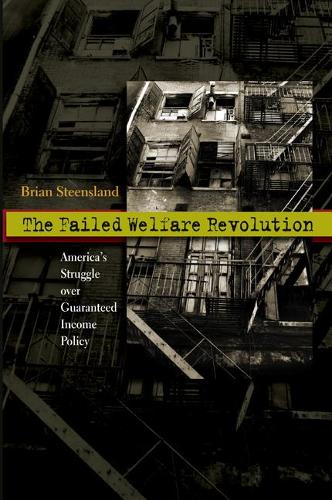
The Failed Welfare Revolution: America's Struggle over Guaranteed Income Policy
(Paperback)
Publishing Details
The Failed Welfare Revolution: America's Struggle over Guaranteed Income Policy
By (Author) Brian Steensland
Princeton University Press
Princeton University Press
8th January 2018
United States
Classifications
Professional and Scholarly
Non Fiction
Poverty and precarity
Housing and homelessness
362.582
Physical Properties
Paperback
320
Width 152mm, Height 235mm
Description
Today the United States has one of the highest poverty rates among the world's rich industrial democracies. The Failed Welfare Revolution shows us that things might have turned out differently. During the 1960s and 1970s, policymakers in three presidential administrations tried to replace the nation's existing welfare system with a revolutionary pr
Reviews
Winner of the 2009 Best Book Award in Political Sociology, American Sociological Association Co-Winner of the 2009 Mary Douglas Prize for Best Book, Section on Sociology of Culture, American Sociological Association "[T]his monograph ... represents a substantial achievement and a major addition to the literature on America's welfare state."--Edward D. Berkowitz, Journal of American History "The Failed Welfare Revolution is a well-researched book that fills a significant gap in the literature on U.S. social policy. The theoretical perspective is innovative, and Steensland makes a strong case for the study of the role of ideas and culture in policymaking."--Daniel Beland, Political Science Quarterly "Brian Steensland's highly detailed account and analysis of guaranteed annual income (GAl) proposals during the Nixon and Carter administrations provides an important contribution to the research on social welfare policy in the United States, addressing a significant lacuna in this literature."--Kenneth Hudson, American Journal of Sociology "This scholarly book will be a valuable resource for anyone interested in current debates about the merits of a guaranteed income policy. It is richly documented, draws effectively on theoretical ideas and transcends the limitations of many historical accounts by linking developments in the 1970s to current social welfare debates. An added bonus is the discussion of proposals by the Carter administration later in the decade to reformulate these ideas. The author's reflection on the role of cultural factors in social welfare thinking also makes a significant contribution and will hopefully facilitate future analyses that will explore the importance of culture in social policy."--James Midgley, Journal of Sociology and Social Welfare "The Failed Welfare Revolution is an interesting retelling and synthesis of what happened some 40 years ago, and anybody interested in the subject will find this work to be of value."--Ralf Hertwig, Monthly Labor Review "Steensland's precision in analyzing the guaranteed income debates throughout the book is impressive, as is his use of extensive original research from presidential archives. He has done a great service in so thoroughly deconstructing for the first time a neglected episode in the history of us (and Canadian) social policy."--Richard Pereira, Labour-Le Travail "[A] theoretically rich and historically detailed account of domestic policy centered on the 1970s."--Richard K. Caputo, Eastern Economic Journal
Author Bio
Brian Steensland is assistant professor of sociology at Indiana University.
